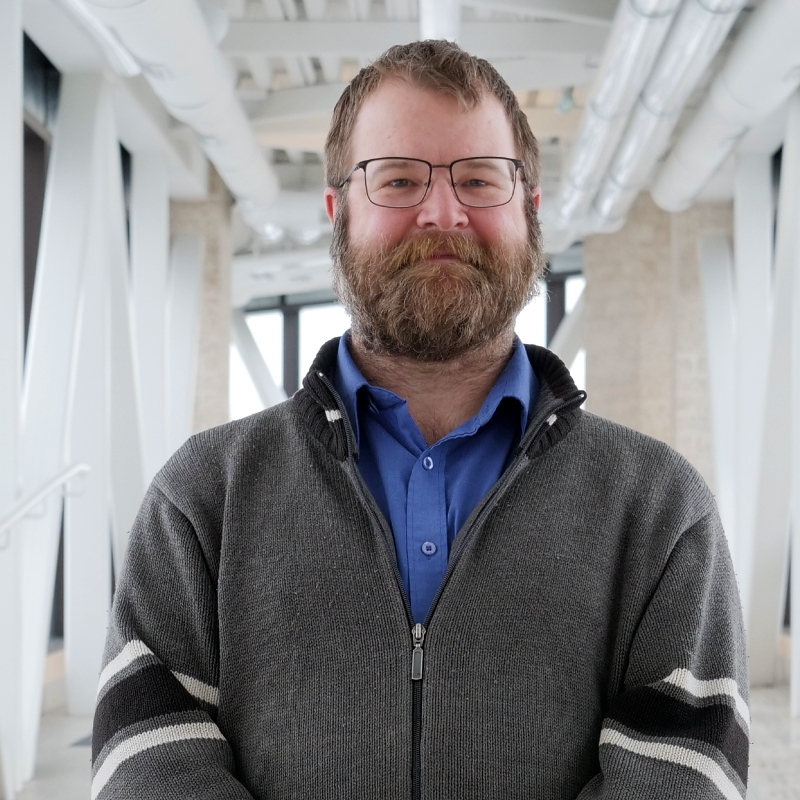News and Releases

Faculty Profiles
Faculty: In Their Own Words - Dr. Jonathan Sears
Thursday, January 26, 2023 @ 12:45 PM | Faculty Profiles

Dr. Jonathan Sears is Associate Professor of International Development Studies, Affiliate Faculty of Political Studies, and Associate Dean of Menno Simons College (MSC), a program centre of CMU. He has taught at CMU since 2008, primarily from the MSC campus.
What are you researching and writing?
I'm coauthoring a book chapter with Jodi Dueck-Read, Assistant Professor of Conflict Resolution Studies and Director of Practicum at MSC. It's about the successes and challenges of decolonizing our pedagogy, of anti-oppression pedagogy, particularly as it relates to our fields in global development and peacebuilding studies. An edited collection by Indiana University Bloomington, it's research and writing about our teaching practice. For me, to write about that is new, but that's part of what we do as teachers; we teach and reflect on our practice, what works, what doesn't, when, with whom. To take a step back and do a bit of analytical work and connect it to some of the literature about anti-oppression pedagogy, how to teach in a way that decentres straight, white, male views or decentres settler views or decentres majority views.
My contribution comes from how I've been leading the senior seminar in international development studies for the last 15 years. How to walk with students where they think about who they are in wanting to do this work. "Lord, make me an instrument of your peace," right? Well, if we are instruments, we need to think carefully about who we are as instruments. To dig into that with senior students has been super rewarding
What do you most long for in your work?
There's the Serenity Prayer, I forget who was the original author of it, but I was sort of riffing on it: May I have the serenity to know there are things my students need to learn that I won't be able to teach them, the courage to teach them the things I can, the wisdom to know the difference, and the humility to get out of the way so students can teach and learn with each other.
What are you teaching right now that you're most excited about?
I taught a global politics course in the fall. I'm excited to teach more political studies courses because the students I'm meeting are really engaged and interesting. There's a few things that are in the mix...comparative politics of sub-Saharan Africa comes out of my research, or a course on peace and conflict in world politics. I've been in conversation with the political studies chair about something around authority and legitimacy—how we think about who has the authority or right to govern and how is that responsibility given to them? There's different ways in which this kind of legitimacy gets cultivated and reinforced. Those are interesting questions to me.
Where or how do students give you hope?
Students give me hope when I see them teaching and learning with each other—sometimes because of things I do and choices I make, and sometimes despite things I do and choices I make. I feel that as a teacher, one of my key roles is to set the conditions that allow for learning to happen and then kind of get out of the way. That's hard because if you're someone like me, you get excited and you want to get in there. So what really excites me is when students take that initiative and are themselves excited by the question I've posed or a question that arises from the material or something they're bringing in from their own experience, and that peer-to-peer teaching and learning happens.
Do you have any interesting projects underway in the broader community or church?
I'm honoured and blessed to serve on the children's ministries committee at Fort Garry Mennonite Fellowship. One of our theme verses is Colossians: Whatever you do, do it with your whole heart. So we've asked members of the congregation to spend 10 or 15 minutes with the kids, sharing about something they do with their whole heart. To hear from people who have welcomed strangers into their home for decades, done yoga instruction, knitting, quilting, baking bread, collage crafts—it's been great. It's been a form of reconnecting the congregation with the kids in our congregation. To get to be part of that has been really good.
What saying or motto inspires you?
Very early in the pandemic, a friend of 35 years said, "Indignation is exhausting." I come back to that idea when I'm feeling weary and there's creeping self-righteousness or judgment. Being indignant about x, y, or z, especially what other people do that I don't have any influence or control over, is actually just going to be exhausting. That's been helpful, for navigating a number of things through pandemic. Being able to rein in any kind of impulse to self-righteousness has been really life-giving for me.
KEYWORDS: Menno Simons College, faculty, faculty in their own words, fitow, Jonathan Sears, IDS, International Development Studies, MSC, Menno Simons College

 Print This Article
Print This Article